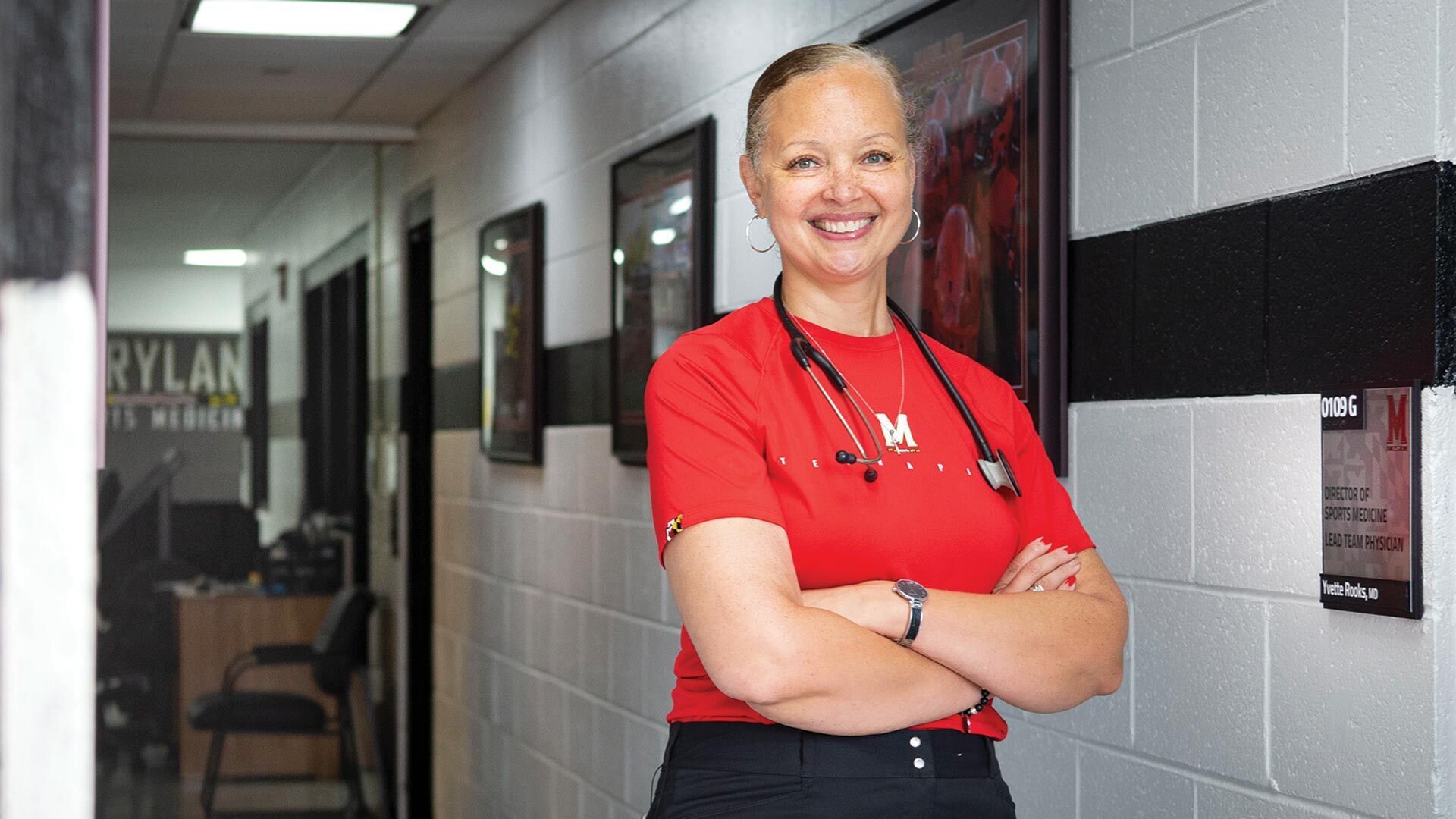- October 26, 2020
- By Annie Krakower
As the Terps battle their Big Ten peers through a nine-game, COVID-shortened football schedule, the University of Maryland is playing a key role in the conference’s game plan beyond the field to support student-athletes’ health.
Besides daily antigen testing for all competing players, coaches and trainers, the stringent medical protocols that the Big Ten put in place this season include enhanced cardiac screening. Now, the 14 member institutions are compiling data from those tests into a new registry, with health experts at labs on the College Park campus and at the University of Maryland, Baltimore (UMB) helping to analyze the potential coronavirus-cardiac association among athletes.
“We know that some viruses can be more angry and do worse things,” said Dr. Yvette Rooks, UMD’s head team physician and assistant director in the University Health Center. “One of those things that we’re really concerned about is how (COVID-19) affects the heart and if it can cause an inflammation of the heart.”
As doctors learned more about the burgeoning virus this spring and summer, studies revealed that some people who’d contracted COVID-19 showed signs of such inflammation, called myocarditis, which is a risk factor for sudden cardiac arrest. That’s especially relevant for athletes, who routinely give their hearts a workout on the field or court.
To help mitigate those risks, Rooks collaborated with Dr. Geoffrey L. Rosenthal, UMD’s team sports cardiologist and a professor in the Department of Pediatrics at the University of Maryland School of Medicine, to develop a thorough medical evaluation for student-athletes, including symptom assessment, bloodwork and a battery of cardiac tests. As the fall season neared, Rooks, a member of the Big Ten Return to Competition Task Force medical subcommittee, and Rosenthal, part of the conference’s cardiovascular task force, shared those ideas and policies.
“Many of the schools in the Big Ten adopted our algorithm for how we’re taking care of our student-athletes,” Rooks said. “So then this bigger consortium … can now say, ‘Okay, how can we clinically look at all the subject matter that we have?’”
While football players and, as of last week, men’s and women’s basketball players are receiving daily antigen tests as protocol for their seasons, student-athletes from any sport who test positive for COVID-19 undergo the cardiac evaluation. UMCP’s MPowering the State partnership with UMB, including its School of Medicine, allows tests to be done on both campuses, with Rosenthal bringing specialized technicians from the medical school to the University Health Center as needed.
“(The tests) tell us whether there’s been even pretty subtle injury to the heart muscle cells, whether there’s been any swelling in the heart muscle cells and whether there’s any scarring of the heart muscle,” said Rosenthal, who meets with each athlete to go over their test results. “Then we can also see if there are any functional changes because of COVID.”
That clinical diagnostic data is interpreted and entered into the conference’s new cardiac registry. Although the registry itself will be compiled in a data warehouse at Ohio State University, two core labs, for MRIs and epidemiology, are at Maryland, so experts here process all MRI data and design research methods to make sure the results are valid.
“Our goal is to identify and mitigate the risk factors for sudden death,” Rosenthal said. “Then there are a number of other scientific questions, like, ‘Do the MRIs of athletes with COVID look similar to the MRIs of athletes without COVID?’ These are questions that aren’t specifically going to be answered in the registry, but will be answerable using the registry data plus other information.”
The hope is that the registry will help address those questions not just within the Big Ten, but eventually, for high school athletes, competitors at other universities and beyond.
“We’re just at the phase now of collecting information. And then the next phase will be, what are we doing with it, and does it change our treatment plan?” Rooks said. “It’s a constantly changing environment.”
